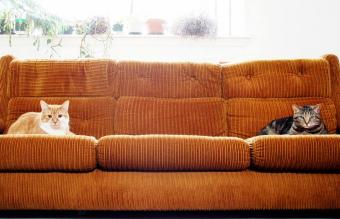
There's no denying that most cats love lasers. The reflection of the laser on surfaces triggers a strong prey response they can't resist. This is instinctual for your cat. They almost can't help themselves when they see a fast-moving laser flying around. But there may be more to it than just the simple joy of chasing something that flashes in the air. The small laser dot stands out, and it moves in a way that activates your cat's prey drive in a strong way.
Why Do Cats Like Lasers?
Cats are predators, and they are naturally curious about new things. Because the dot a laser pointer creates stands out and moves so quickly, it's almost like it switches your cat's prey drive on. Sometimes, it even seems to make them hyper. If you've ever watched your cat play with a laser pointer, you know how fast they can move and how stimulating laser pointers can be.

For many cats, laser pointers help hone their hunting instincts while offering enrichment. This is mostly positive, and cats also enjoy being rewarded after laser pointer play. This reward system encourages them to keep trying until they succeed at catching their prey, or in this case, the laser.
Enrichment Is Positive
Cats love the thrill of the hunt, so when you play with a laser pointer, your cat is getting their fix on this natural behavior. Cats also like to keep their brains active. In fact, studies show that playing with toys can help prevent cognitive decline as they age. So if your cat isn't using their brain enough during their everyday routine, which may include sleeping 18 hours per day, they will be more than happy for any opportunity to work out their mental muscles!
Not all cats enjoy playing with laser pointers. Try alternatives, such as moving mouse toys, cat wand toys, or other forms of enrichment to entice your cat to play.
Offer a Social Reward
Cats are social creatures, and playing with your cat is a great way for you to bond with them. A laser pointer gives them the chance to interact with you in a fun and rewarding way. Cats love chasing after these little red dots, so it's no wonder they get so excited when their owners pull out their laser pointers!
If you use laser pointers as an enrichment activity for your cat, play with them one-on-one, and be sure to reward them when playtime is over. This is an important step, because it allows your cat to complete the second part of their predatory behavior.
Laser Pointer Play Dos
Make sure not to overwork your cat. Start slowly, under controlled conditions. Keep it positive:
- Keep play sessions short. Start with five to 10 minutes of laser pointer enrichment.
- Let them finish the game. Do not tease them or never let them get close to the laser. Make sure they succeed and catch the laser during play, and reward them with a small treat.
- Make sure they're safe. Be careful where you point the laser light, to avoid breaking anything, and to keep them from hurting themselves.
Don't shine the laser on a spot high up on the wall, out of your cat's reach. This can lead to unsafe situations if your cat attempts to leap for the light.
When Laser Pointer Play Goes too Far
Some animal behavior experts argue that laser pointers do not offer positive enrichment. Laser pointers can lead to obsessive behavior, known as laser pointer syndrome.
While lasers encourage cats to run around, because they can never truly "catch" the laser, they can become frustrated. Ultimately, this can cause obsessive behavior in cats, where they begin chasing any light reflection or the movement of shadows.
Also, older cats who suffer from cognitive dysfunction syndrome (CDS) and who have never played with lasers can become overstimulated by environmental changes. Be careful about when you introduce lasers to your cat, and avoid introducing an aging cat with CDS to overstimulating activities. Check with your veterinarian to be sure playing with laser pointers is a good idea for your cat.
Laser Pointer Tips
Not all lasers are the same. Choose the right laser pointer for your cat:
- Choose a yellow or red light rather than blue or green because cats are attracted to these colors. Blue and green lasers may be too bright for cats' eyes and can cause temporary blindness. Red and yellow lasers are less likely to cause this problem because they're not as bright.
- Pick a small laser that fits comfortably in your hand so you can control it easily while playing with your cat.
- Use a sturdy laser pointer. Most lasers on the market are made from plastic, which can be dangerous if it breaks and the batteries come loose. Look for one that is made of metal instead.
- Look for one with a button-activated switch rather than an automatic on/off switch. This way you can turn it off easily if you need to put it away or turn it off while playing with your cat.
- Get one with a high-quality laser diode so there will be no loss of battery life due to low-power output.
Never shine a laser into your cat's eyes. This can permanently damage their eyesight.
Play Safe With a Laser Pointer
Offering your cat enrichment activities is very important for their development. Just be sure you do so in safe, positive way. Laser pointer play can help you bond with your pet, and it will also keep them healthy and active.







